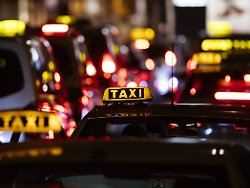Friday March 26th 2021
Taxi drivers fear for orders
Uber and Co. now transport passengers legally
The Federal Council approves the Passenger Transport Act initiated by Transport Minister Andreas Scheuer. This means that transport service providers such as Uber can now legally accept passengers – but only if they have previously booked.
The new Passenger Transport Act is wrapped up and now creates the legal basis for travel service providers such as Uber and Moia. The Federal Council unanimously approved the amendment to the law after the Bundestag had given the go-ahead for the Union and SPD’s draft law at the beginning of March. Federal Minister of Transport Andreas Scheuer had made it his goal to create separate legal bases for driving brokerage services and to allow the new offers as regular. In negotiations with the coalition factions and the Federal Council, a “balanced compromise” was finally found, according to him.
The law provides, for example, that the new providers only accept orders that have been previously ordered by phone or app. Taxis, on the other hand, are still the only ones allowed to pick up spontaneous passengers. In addition, there is still an obligation to return to the company headquarters for rental cars without orders. According to the draft, taxi drivers do not have to take a local knowledge test – instead, they will in future be obliged to “keep a state-of-the-art navigation device available”. The Federal Government will now submit the law to the Federal President for signature. It can then be announced in the Federal Law Gazette and comes into force after a transition period of a few months.
The Federal Association of Taxi and Rental Cars declared that the most important signal for consumers was to keep “reliable tariffs in the taxi”. For large cities, however, the association wanted “more and clearer rules to prevent a flood of dumping traffic”. A solution urgently needs to be found here. The law also regulates innovations for local public transport. Among other things, a so-called scheduled service is planned in the future. This allows local transport companies to react more flexibly to peak times or special features in rural areas.
.
